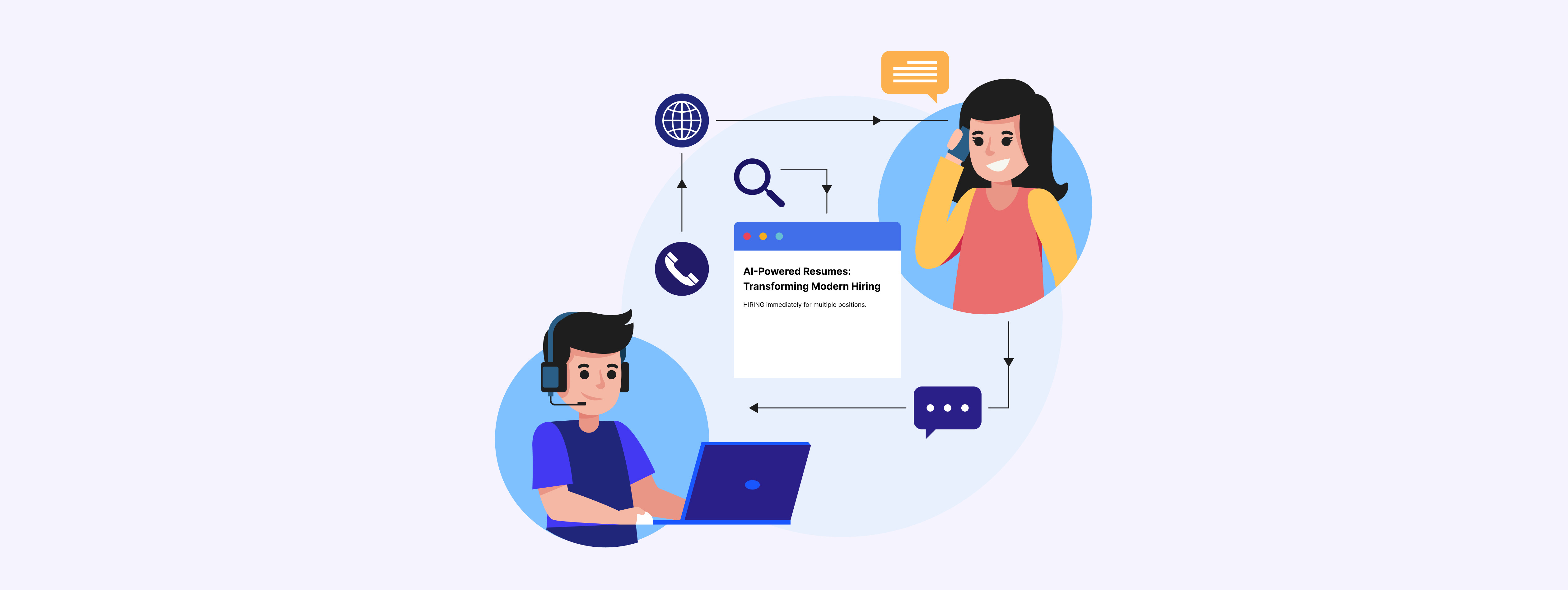A job search used to be fairly straightforward. Candidates would submit a resume and cover letter, go through a few interviews, and hope for the best. Recruiters and hiring managers would sift through resumes, do some preliminary interviews, and get the ball rolling.
But that’s all changing—candidates and recruiters are caught up in a kind of AI arms race in which each side is leveraging the technology in new ways that makes the old methods nearly useless. Job seekers are able to tailor their resumes and apply to more jobs than ever before, but recruiters are getting buried in an avalanche of applications, and leaning on AI to sift through the pile.
But we’re still just in the beginning stages of the recruitment transformation, writes my colleague Emma Burleigh. She spoke with experts who say that keyword skill searches are child’s play compared to what we will see from recruiting over the next few years.
They predict three major future trends:
-
AI will become an even bigger part of the recruiting process, and could even be used to select the final batch of candidates for a job.
-
Candidates will be tested in all kinds of new ways, as hiring managers get more and more skeptical that the skills on their resume are real, and not just designed to get past AI filters.
-
The ranks of recruiters will thin, as the job is phased out or turned into a new kind of position—talent advisors.
AI is Making the Job Easier for Some, More Difficult for Others
Employers in Ireland are increasingly wary of job candidates using artificial intelligence (AI) tools like ChatGPT to write their CVs and applications with some already using AI-detection software to sniff out the practice, a new IrishJobs survey has revealed.
Published on Monday, new research from recruitment and jobs search platform IrishJobs reveals an almost even split between senior company leaders and recruiters who say AI is making their job easier and those who believe it is making the recruitment process more difficult.
While 71 per cent of medium-sized businesses believe the technology has made recruitment processes more efficient, 46 per cent of the 250 businesses of all sizes that responded to the survey overall said AI is making things more difficult.
Almost one third of respondents said they are aware that job candidates are using AI tools to write their applications and CVs. Of that cohort, 71 per cent said they have had to increase focus on interview evaluation to ensure candidate quality while almost 40 per cent have introduced detection software to weed out jobseekers using generative AI tools in the hiring process.
Sam Dooley, Ireland country director for IrishJobs parent Stepstone Group, said this is one reason why almost half of senior leaders believe AI is making recruitment more difficult.
“They’re spending more time trying to identify whether this is somebody’s real CV.”
Overall, slightly more than half of in-house recruiters said AI is making things easier for them. Of that cohort, 42 per cent said they use AI tools to send reminders while a further 42 per cent use it track candidate application statuses.
At the moment, the technology is mainly used for smaller, administrative tasks within the hiring process. But using AI to complete these tasks can free up time for recruiters to focus on candidate quality and “strategic thought in terms of actually hiring the right talent,” Mr Dooley said.
However, a large minority – around 19 per cent – of employers said they are relying on AI alone to run their hiring processes and select candidates for interview.
“If you have 100 CVs applications for a role, it’s extremely difficult to go through every single CV,” Mr Dooley said. “But you can use AI to automate that process so that [it can] tie skills back to the job description and that can bring in the best talent.”
The survey found that 56 per cent of Irish firms have introduced AI into their recruitment processes with medium sized businesses the fastest adopters of the fast-moving technology and smaller companies the slowest.
AI-Generated Resumes Are Flooding Inboxes
The hiring process is evolving—and not always in ways that make life easier for recruiters or those who screen resumes. AI-generated resumes are flooding inboxes, and companies that once celebrated the efficiency of artificial intelligence in hiring are now dealing with a whole new problem: candidates using the same technology to game the system. Katherine Bindley from the Wall Street Journal captured this shift well. The article makes a strong case for bringing more human judgment back into hiring, but there’s an even deeper layer to explore here—one that only a curiosity-driven approach can unlock.
Why the “Perfect” Resume Might Be a Red Flag
Let’s get real. The idea of a “perfect” resume has always been a bit of a myth. Now, with AI tools churning out polished, cookie-cutter resumes faster than ever, it’s becoming more apparent that a too-perfect resume is actually a red flag. In fact, it might be signaling the opposite of what you want—a lack of authenticity.
AI-generated content can make anyone look like an all-star on paper. But here’s the kicker: real life isn’t as clean-cut as a bot-generated resume. True professionals have stories, experiences, and yes, a few bumps in the road. They’ve learned from failed projects, navigated office politics, or pivoted careers when things didn’t go as planned. Those are the rough edges—the realities—that tell you more about a person than a string of generic achievements ever could.
AI Isn’t Always Right: The Need for a Human Touch in Hiring
But let’s not pretend AI is a magic bullet. As a recent BBC article by Charlotte Lytton pointed out, these AI-driven hiring platforms—think one-way video interviews, body-language analysis, and CV scanners—sometimes cut out great candidates for all the wrong reasons. Picture this: a talented candidate gets dinged for not having the “right” hobbies or facial expressions that match the company's existing profile. That’s not just unfair—it’s shortsighted. AI might save time by processing mountains of resumes, but it can also bury the gems in the pile if we aren’t careful.
Not All AI is Bad: When Using AI Tools Shows Smart Skills
While we’ve been focusing on the downsides of AI-generated resumes, it’s important to recognize that using AI isn’t inherently a bad thing. In fact, it can be a plus. If a candidate uses AI to enhance their resume and it doesn’t come across as robotic or overly generic, it might indicate they know how to leverage technology to organize and present information effectively. That’s a skill—especially in roles where attention to detail, efficiency, and the ability to utilize digital tools are key.
Think about it: if someone applies for a role that involves managing large datasets, creating reports, or keeping track of vast amounts of information, their ability to use AI efficiently could be a valuable asset. The trick is to determine if they’ve used AI just to look good on paper or if they truly know how to integrate these tools into their workflow to enhance their performance.
The key is not to dismiss AI use outright but to evaluate how it’s being used. Are they just applying a superficial polish, or are they using AI to bring clarity and order to complex information? The latter could be a great sign that they have the tech-savvy and strategic thinking needed for the job.
Digging Deeper: How Curiosity Cuts Through the AI Clutter
The Wall Street Journal article highlighted the problem well—automation is helpful, but it can’t do the whole job. Companies are starting to pull back from relying solely on tech solutions and are bringing the human touch back into their hiring processes. But here’s the one thing that article missed: it’s not just about reintroducing human judgment; it’s about reintroducing human curiosity.
How to Use Curiosity to Spot AI-Generated Resumes
So how do you start applying curiosity in your resume screening process? Here are a few curiosity-driven tactics to help you sift through the noise:
-
Look for Inconsistencies: AI-generated resumes can sometimes be too perfect, with consistent formatting and language. Pay attention to any inconsistencies in formatting, grammar, or tone that might signal a human hand at work.
-
Ask About Specific Experiences: Instead of asking generic questions, ask candidates about specific challenges they faced, how they overcame them, and what they learned from those experiences. This will give you a better sense of their real skills and how they’ve applied them in the past.
-
Don’t Fear the Gaps: Many resumes have gaps in employment, and AI-generated resumes often try to smooth these over. Instead of seeing a gap as a negative, consider it an opportunity to learn about the candidate’s career trajectory. Maybe they were pursuing a personal goal, taking a break to care for family, or switching careers. Their story could be much more interesting than a generic bullet point.
-
Uncover Passion and Interests: What do they do outside of work? What are they passionate about? These questions can help you understand their personality and how they might fit into your company culture.
-
Don’t Just Read, Engage: Engage in a real conversation with the candidate. Show interest in their experience and ask follow-up questions. Genuine conversation will help you understand their personality and communication style, which is crucial for determining if they’ll be a good fit for your team.
One Big Lesson for Hiring Managers: Curiosity is Your Secret Weapon
The Wall Street Journal got it right: more human oversight is needed. But let’s take it a step further. Train your team to adopt a mindset of curiosity. Create an environment where it’s not just acceptable but encouraged to ask, “What’s the story here?” Build a culture where curiosity isn’t just about asking more questions, but the right ones. The kind that digs beneath the surface and gets to the heart of who someone is and what they can bring to your organization.
In the world of AI-generated resumes and automated applications, the real differentiator isn’t more technology. It’s a human touch guided by curiosity. It’s knowing how to ask the questions that matter, spotting the inconsistencies that a machine might miss, and digging into the stories that reveal the true character of a candidate.
So, don’t let AI-generated content overwhelm your hiring process. Use it as a prompt to dig deeper, to ask more profound questions, and to stay sharp. When you approach hiring with a curious mindset, you’re not just filling roles—you’re building a team that’s ready to take on whatever comes next.


















